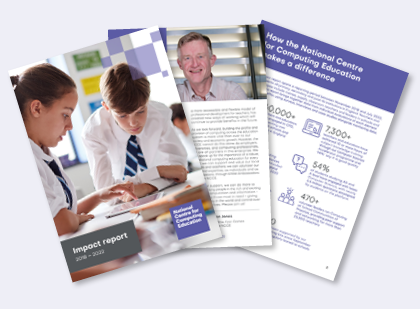Impact, evaluation and research
Our vision is for every child in every school in England to have a world-leading computing education. We continually evaluate the impact that our programmes, services and resources are having on improving the quality of teaching computing in schools, and the learning experience for young people.
Impact and evaluation reports

NCCE Impact report 2018 to 2022
Published January 2023
Impact report published to mark the key achievements of the NCCE between 2018 and 2022. Features information about the impact of the NCCE’s programmes, including key statistics on engagement and reach, testimonies from teachers and students and an overview of our future goals.
Computer Science Accelerator Graduates Evaluation (cohort 2)
Published July 2021
Read the experiences of our second cohort of graduates and the impact of completing the programme (now known as KS3 and GCSE Computer Science subject knowledge certificate) on themselves, their students and colleagues. You can also read our Executive Summary.
Published November 2020
Impact Report published to mark the two-year anniversary of the NCCE. Covers all aspects of the NCCE programme, including key statistics on engagement and reach.
Computer Science Accelerator Graduates Evaluation (cohort 1)
Published October 2020
Reviews feedback from the first graduates of the programme (now known as KS3 and GCSE Computer Science subject knowledge certificate), covering programme quality, value, impact, and overall experience.
Research and curriculum reports
Programming and Algorithms Report
Published January 2022
This report explores the importance and progression of the programming and algorithm strands of the English computing curriculum, and how these strands are covered in the Teach Computing Curriculum.
- All learners should have the opportunity to develop computer programs to solve problems in a range of contexts.
- Programming encompasses several levels of abstraction (including writing code) which learners should be familiar with and comfortable switching between.
- Through practice, learners can become familiar with a range of common programming patterns, recalling them and applying to new and varied contexts.
Gender Insights in Computing Education
Published April 2023
This foundational evidence review was undertaken to inform the design of the NCCE's I Belong programme.
Practical Programming White Paper
Published April 2022
Written by members of the NCCE Academic Board, this highlights the importance of practical programming in young people's computing education.
Computer Systems and Networks Report
Published July 2021
Explores the strands of computer systems and networks emphasising the foundational nature of these topics and the role they play in supporting learning across other strands of computing.
Published January 2021
The importance of digital literacy was highlighted during the COVID-19 pandemic and consequent home learning. This report explores its role within the curriculum.
International Computing Textbook Review
Published December 2020
Reviews the nature and use of textbooks in the teaching of computing to 5 to 16-year-olds in a number of countries around the world, including China, Israel, Japan, South Korea and the USA.
Our research resources
Gender Balance in Computing
Help us find the best ways to encourage young women to study Computer Science by joining our research programme.
Pedagogy
Browse our resources, to understand how to promote effective computing pedagogy.
You might also be interested in
STEM Learning has additional content around impact, evaluation and research you may find valuable.
